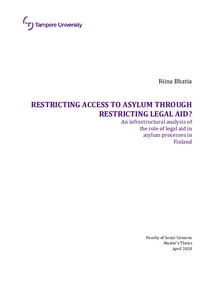Restricting access to asylum through restricting legal aid? An infrastructural analysis of the role of legal aid in asylum processes in Finland
Bhatia, Riina (2020)
Bhatia, Riina
2020
Master's Degree Programme in Peace, Mediation and Conflict Research
Yhteiskuntatieteiden tiedekunta - Faculty of Social Sciences
This publication is copyrighted. You may download, display and print it for Your own personal use. Commercial use is prohibited.
Hyväksymispäivämäärä
2020-05-06
Julkaisun pysyvä osoite on
https://urn.fi/URN:NBN:fi:tuni-202004243731
https://urn.fi/URN:NBN:fi:tuni-202004243731
Tiivistelmä
International immigration is one of the most debated issues in the 21st century. As states are creating increasingly restrictive migration policies, the human rights of migrants and refugees are in flux. This thesis presents a case study on the Finnish immigration management reform that was passed after the relatively large influx of asylum seekers in 2015-2016. As part of the reform, access to legal aid in asylum procedures was restricted. Following the understanding of asylum process as an extension of a complex bordering regime, this thesis intends to understand the role of legal aid through an infrastructural analysis. The theory of migration infrastructure suggests that any study on migration should aim to understand how actors and policies facilitate, mediate and restrict migration trajectories.
Through four thematic expert interviews, this thesis finds that legal aid can be seen to have a preparative, conciliatory and supportive role in asylum processes. Access to diligent and experienced legal aid can thus facilitate the success of an asylum process. Yet, the inability to access legal aid has had severe implications for the rights of asylum seekers. As the asylum process has become much more complicated, some asylum seekers face an increased risk of experiencing various forms of violence, for example through breaching of the principle of non-refoulement or by rendering the asylum seeker to an irregular status when return to home country is not possible. With these developments, the restrictions concerning legal aid can be seen to have influenced the likelihood to gain asylum in Finland.
Through four thematic expert interviews, this thesis finds that legal aid can be seen to have a preparative, conciliatory and supportive role in asylum processes. Access to diligent and experienced legal aid can thus facilitate the success of an asylum process. Yet, the inability to access legal aid has had severe implications for the rights of asylum seekers. As the asylum process has become much more complicated, some asylum seekers face an increased risk of experiencing various forms of violence, for example through breaching of the principle of non-refoulement or by rendering the asylum seeker to an irregular status when return to home country is not possible. With these developments, the restrictions concerning legal aid can be seen to have influenced the likelihood to gain asylum in Finland.
